Community Education Health & Wellness
Parents team with St. Anthony to equip Peninsula school staff with bleeding control kits
A small group of parents, all with backgrounds in healthcare, has teamed up with St. Anthony Hospital to provide bleeding control kits in each of Peninsula School District’s more than 600 classrooms.
The kits will allow for rapid response to traumatic injuries in the event of a school shooting or other emergency, like an earthquake or a severe accidental injury.
The group also volunteered to provide STOP THE BLEED training to teachers and other staff members, an effort that has expanded over the past year. As of Monday, Oct. 16, more than 100 teachers and other school staff have learned how to stop or control acute bleeding when seconds count.
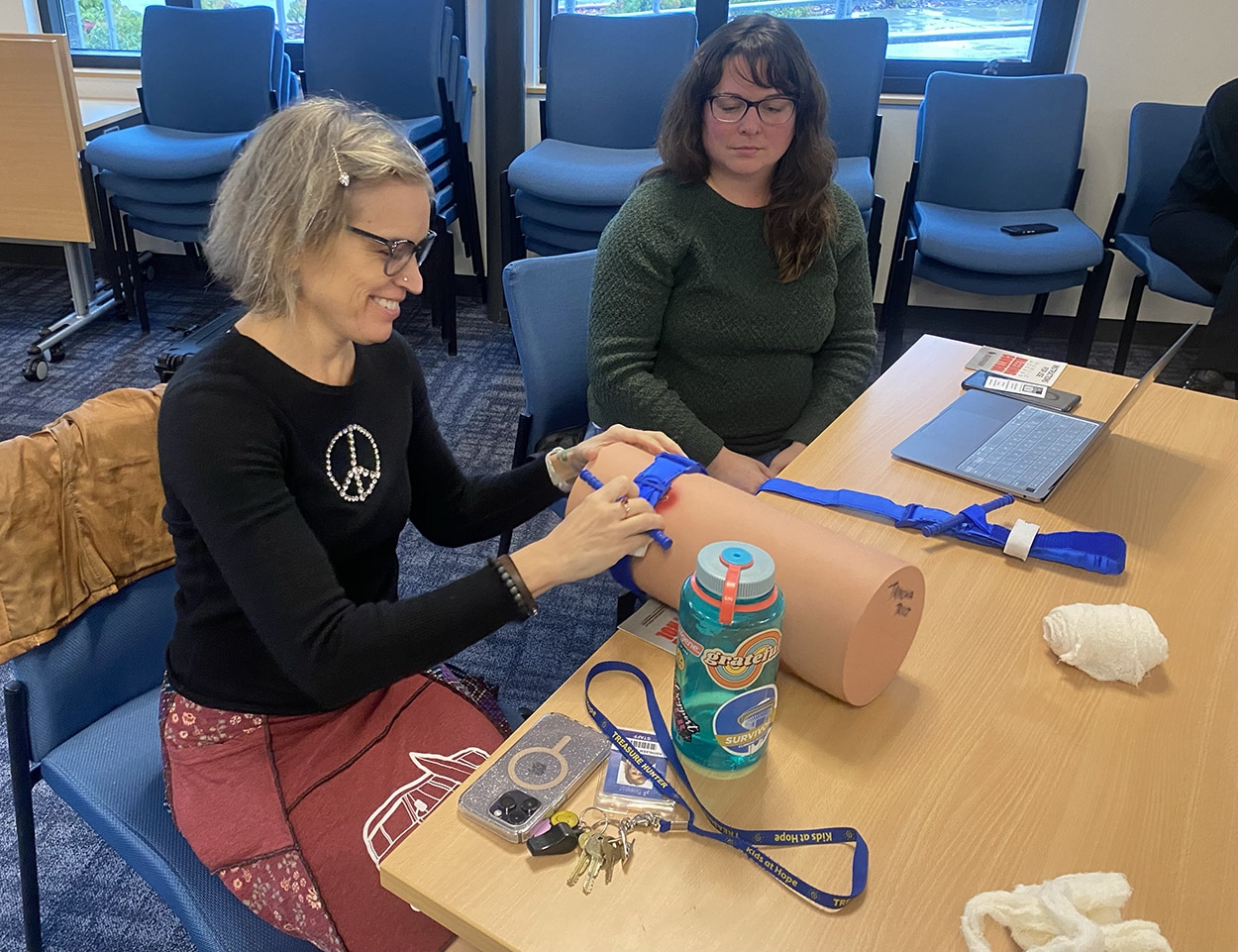
Kathy Johnson, an educator at Voyager Elementary School, practices applying a tourniquet to a mannequin limb during a STOP THE BLEED training Oct. 16, 2023, at Swiftwater Elementary School, while Rachel Dodson, a librarian at Voyager, looks on. Photo by Christina T. Henry
Kathy Johnson, an educator at Voyager Elementary, was among a small group of district employees in a STOP THE BLEED class on Monday at Swiftwater Elementary. She signed up after Voyager classrooms got bleeding control kits last week.
“I thought if they’re going to gift us this material, then I should know how to use it properly,” Johnson said. “Hopefully, I’ll never have to use these skills.”
‘Put a mom on the task’
Katrina Flowers-Piercy, Tiffany Crabb and Shelly Voight, the group behind the training and safety kit initiative, go way back. They met early in their careers while working at Tacoma General Hospital. All have since gone on to become certified physician assistants in fields related to trauma or acute care, and all have children in local schools.
The 2022 school shooting in Uvalde, Texas, galvanized them to ensure their community is better prepared for the unthinkable.
“I was sick over what happened in Uvalde and kept racking my brain thinking, ‘How can I make my children, as well as all other kids and our school staff safer?’” said Crabb, a specialist in trauma and acute care surgery.
Crabb knew she could teach STOP THE BLEED, a national program of the American College of Surgeons that trains ordinary people who may find themselves on the front line of a trauma response. Crabb wanted to rally other certified instructors, and she knew just who could help.
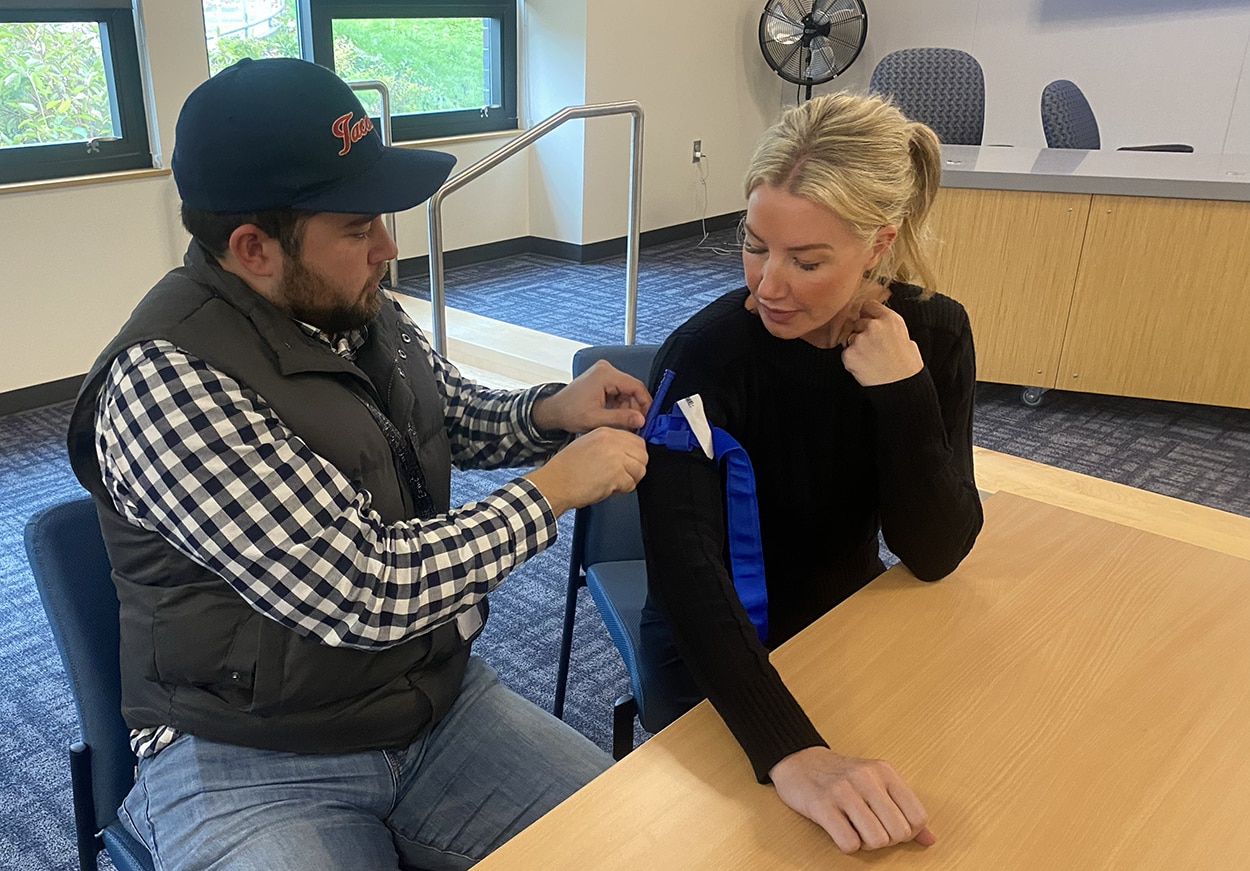
David Rivera, a Key Peninsula Middle School math teacher, applies a tourniquet to Kelly Voight, a volunteer certified instructor during a STOP THE BLEED training Oct. 16, 2023, at Swiftwater Elementary School. Photo by Christina T. Henry
Flowers-Piercy, owner of Lissè Medical Aesthetics spa in Gig Harbor, has an extensive background in emergency medicine and trauma surgery. Voight works in pulmonology critical care with Virginia Mason Franciscan Health, parent company of St. Anthony Hospital in Gig Harbor and other regional hospitals.
“I messaged Katrina and Shelly knowing that they would jump on board with this project and help me implement it,” Crabb said. “I often say if you want something done, then put a mom on the task!”
A community effort
The three approached Peninsula School District Superintendent Krestin Bahr and found her receptive.
“She was on board and supportive and put us in touch with (district health services coordinator) Miriam Atchison to help roll out trainings in the district. Miriam has been incredibly supportive,” Crabb said.
Through various channels within the district, the group learned that Dr. Quinton Hatch, a Madigan Army Medical Center surgeon and department head, had also approached the district about STOP THE BLEED training.
The group joined forces with Hatch. On Aug. 29, 2022, the district’s nurses and some health technicians were trained in STOP THE BLEED.
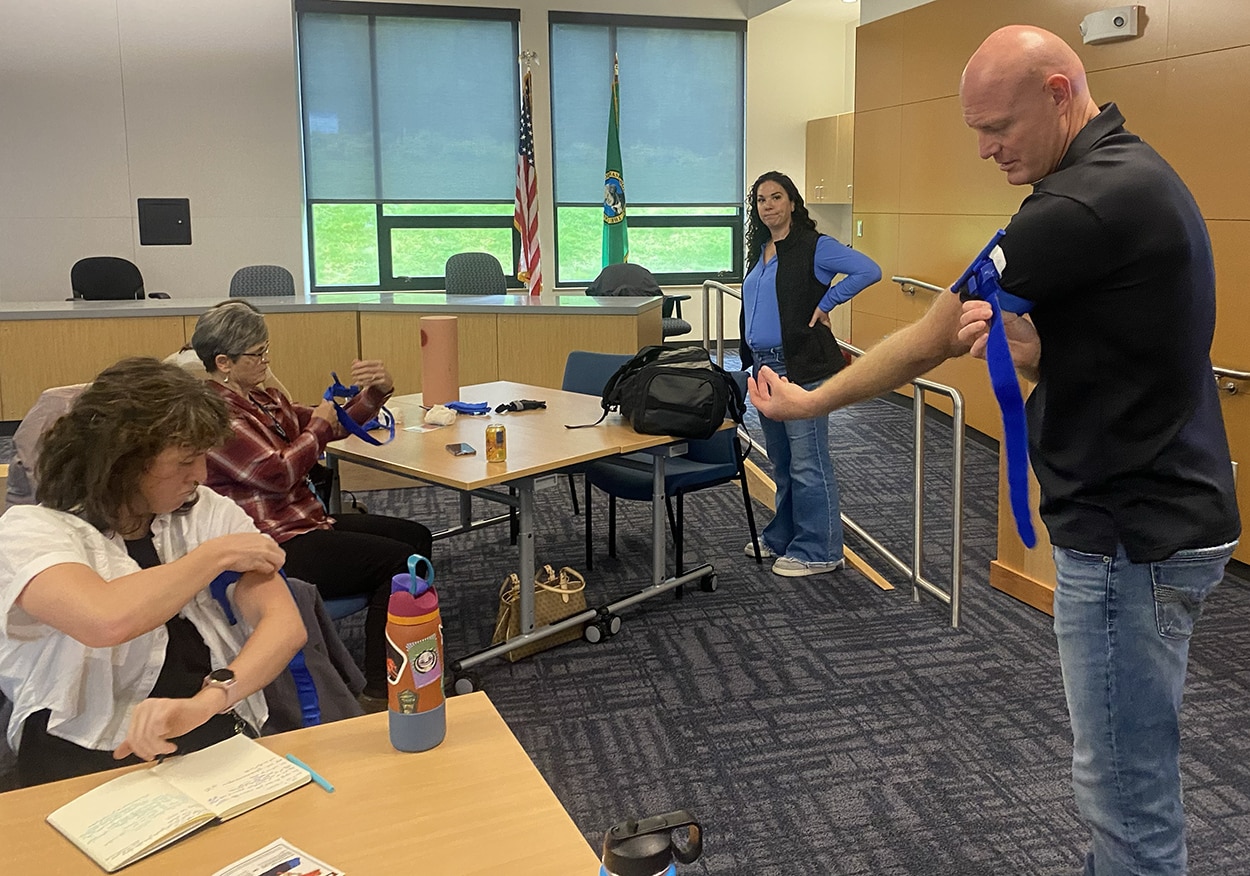
Dr. Quinton Hatch, a Madigan Army Medical Center surgeon, demonstrates how to apply a tourniquet during a STOP THE BLEED training Oct. 16, 2023, at Swiftwater Elementary School. Photo by Christina T. Henry
“Dr. Hatch has been an amazing partner in this endeavor,” said Crabb. “He has been a huge advocate for this program and has aspirations to get this initiative introduced to our state Legislature so that all districts in the state can have this same opportunity for training.”
Gig Harbor Fire & Medic One personnel and other local health professionals have also volunteered their time for trainings.
Training program expands
Dozens of district employees whose positions require them to take First Aid have learned STOP THE BLEED through classes with local fire departments. The group’s goal is to make the training readily available to all employees who want it, regardless of job requirements. They hope it will become as common as CPR and First Aid.
Teachers and other non-medical staff in Peninsula School District were offered trainings about every other month throughout the past school year. The group also hosted an all-staff event in February at Lighthouse Christian School.
Peninsula School District plans to continue offing STOP THE BLEED classes, Atchison said. The training, which runs a little more than an hour, is done off the clock and is offered to PSD staff on a volunteer basis.
Sue Kingsbury, a health tech, said on Monday she was taking the class a second time to brush up on her skills.
“It makes me feel better prepared to act on a scene or to instruct somebody else how to act in a situation,” she said.
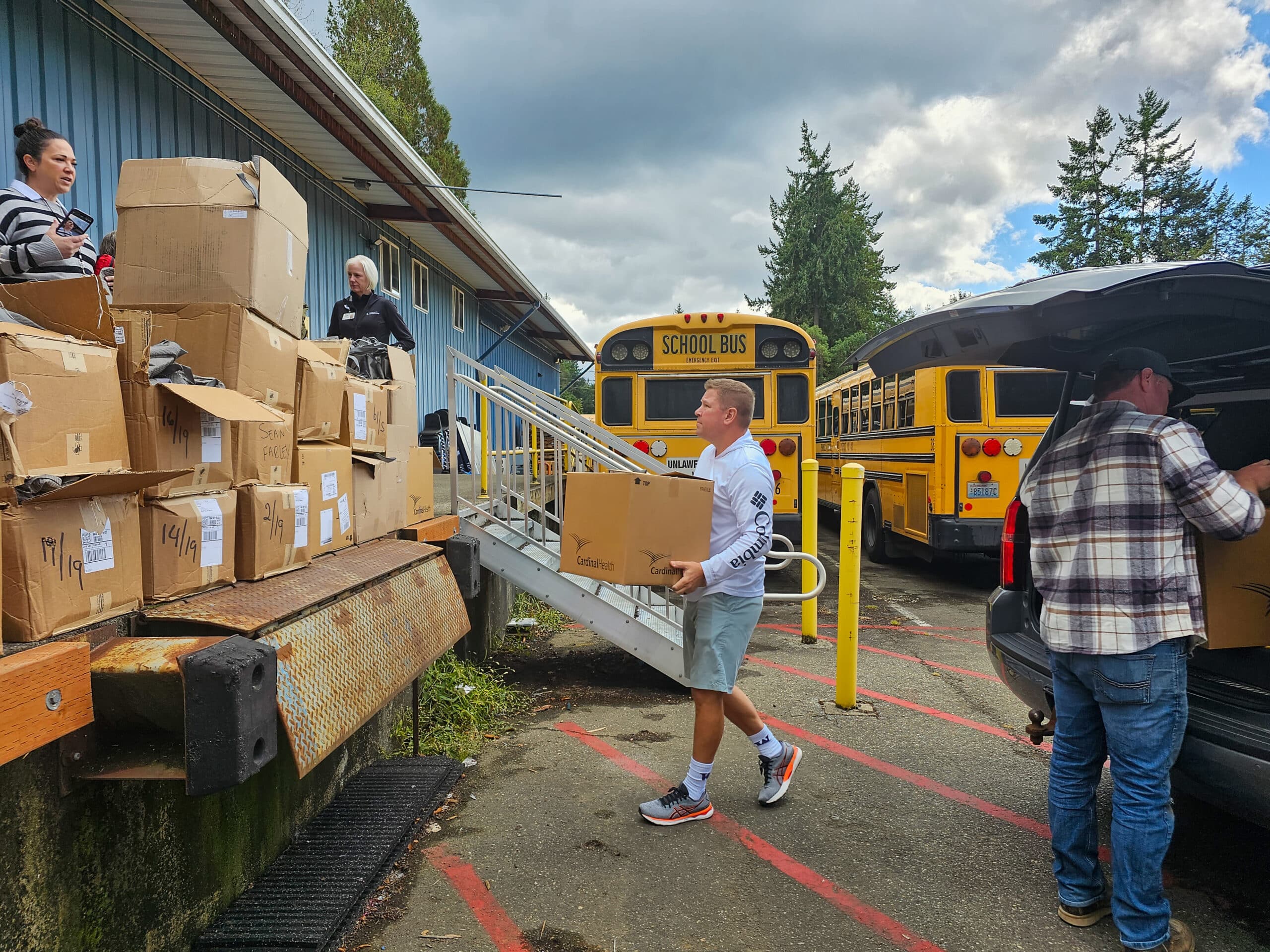
Bleeding control kits are delivered to Peninsula School District in 2023. The kits were secured through the efforts of a group of parents who are also healthcare providers with support from St. Anthony Hospital, Gig Harbor. Photo courtesy Peninsula School District
Kits for classrooms
In addition to training, Crabb, Flowers-Piercy and Voight have donated bleeding control kits to each teacher or school staff member who took the class. Initially, they personally funded supplies and assembled the kits themselves.
Later they asked St. Anthony Hospital for funds to equip all 645 classrooms in Peninsula School District with a kit.
In doing research for their proposal, the group spoke with local fire department personnel and school staff. They found community schools “grossly underprepared in both training and supply with regards to preparation in the event of a mass shooting.”
While many teachers and support staff have training in CPR and the Heimlich maneuver (to aid choking victims) they did not have formal training in hemorrhage control, the group reported. And they lacked access to emergency supplies when they might need them most.
Depending on the location in the body and severity of the injury, someone can bleed to death in as little as three minutes without intervention, according to the training. But in a school on lockdown, teachers and other staff can’t access supplies usually kept in the nurse’s office or other centralized location.
Getting kits in classrooms and more staff trained improves the odds of survival, they wrote.
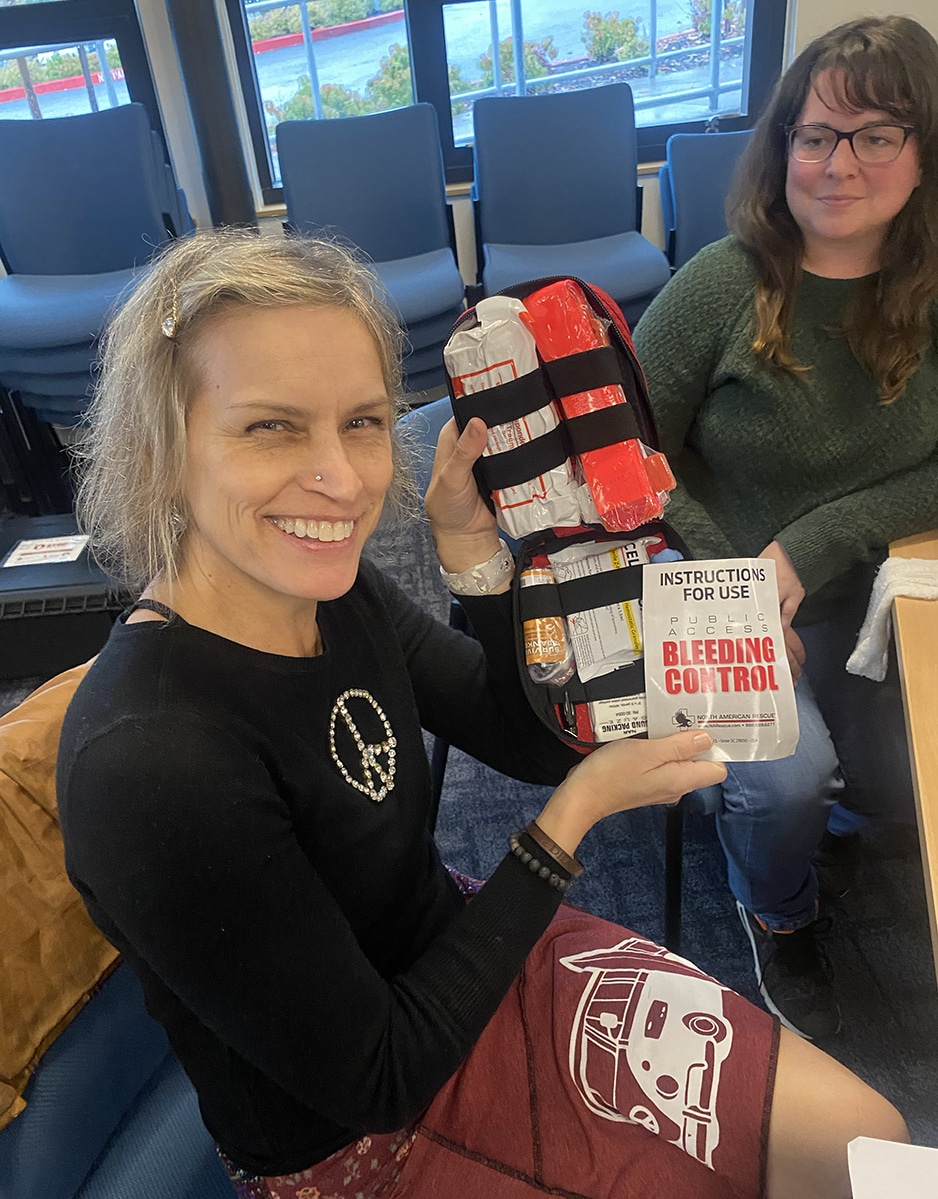
Kathy Johnson, an educator at Voyager Elementary School, displays the contents of a bleeding control kit like the ones that were recently donated by a group of parents and healthcare professionals for every classroom in Peninsula School District, with support from St. Anthony Hospital, Gig Harbor.
St. Anthony gets on board
St. Anthony Chief Operating Officer Dino Johnson readily supported the group’s project. He worked with Virginia Mason Franciscan Health’s supply chain division to get a favorable price on material for the kits.
Each kit comes with a tourniquet and military-grade combat gauze materials impregnated with a solution that, along with direct pressure, helps stop bleeding from penetrating wounds. Both are simple for non-medical personnel to use combined with STOP THE BLEED training instructions. The cost for 645 kits was more than $48,000.
“I think it’s been a really good success story of what can happen when people collaborate and work together,” Johnson said.
“You know I think teachers don’t sign up to be medical providers when they’re choosing this career path,” said Flowers-Piercy. “But the overwhelming response that we’ve gotten from teachers is that should they be placed in a situation where they needed to provide some first aid, they felt much more comfortable doing so with the training we provided and the tools that we provided.”
Kits delivered to schools
Securing the funds and ordering the supplies took nearly a year. The district recently took delivery of the kits.
“The benefits of this training and supplies to our schools is that staff will feel comfortable and know how to use the items in the bleeding control kit. Especially how to apply tourniquets, compression bandages and hemostatic gauze in case of people with uncontrolled bleeding in the school setting,” Atchison said.
In addition, the group has started an organization, Tourn-a-Kits for Schools where individuals or groups can donate toward the cause.
“We want you to feel ready for any emergency and hope you never have to use your training,” their website says.
‘Sometimes we’re all we’ve got’
Stop the Bleed, which began in the military, gained wider traction after the Sandy Hook school shooting in 2012. Hatch is vice chair for the Washington State American College of Surgeons Committee on Trauma. He coordinates STOP THE BLEED trainings statewide as requested by local entities.
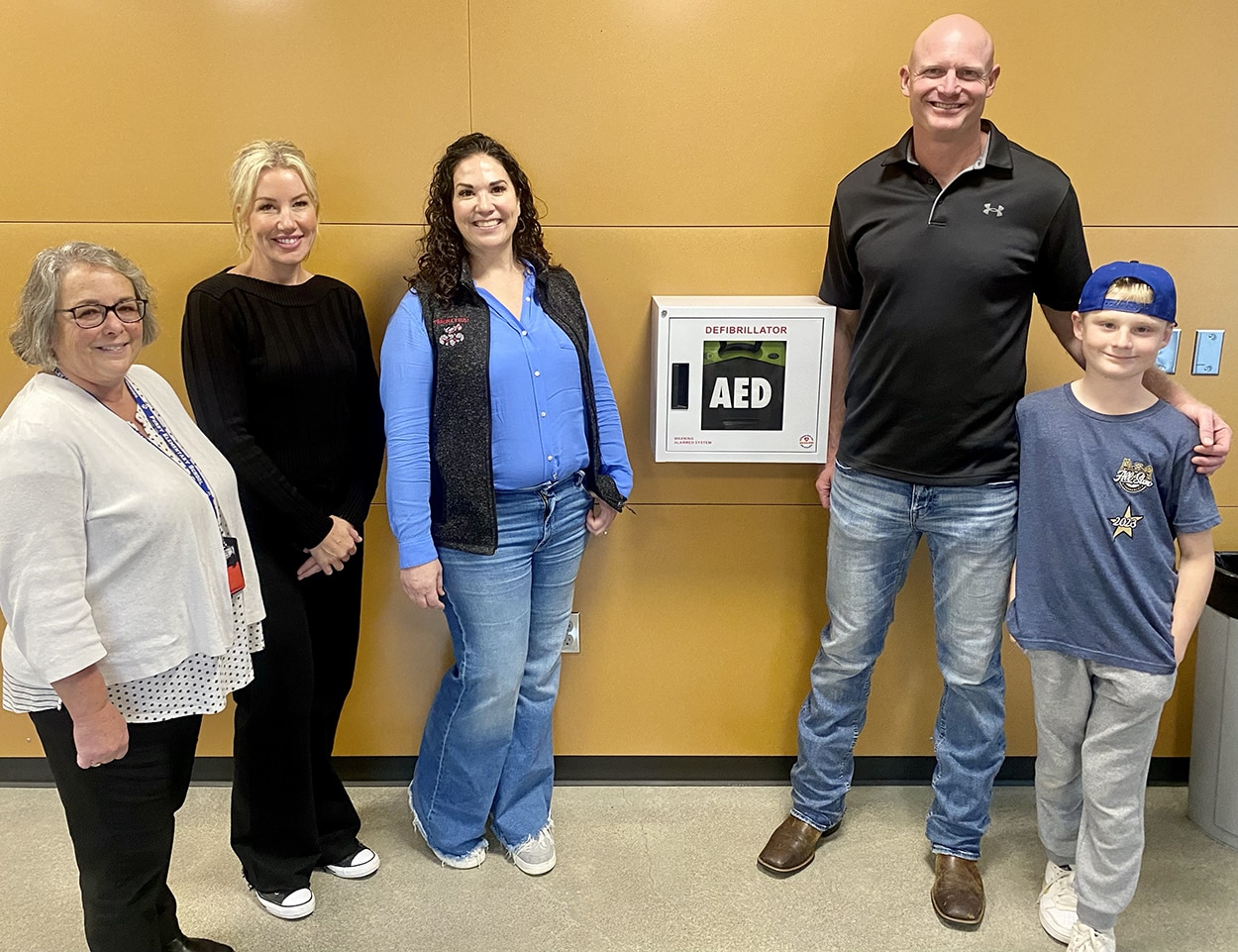
Members of the team that is providing STOP THE BLEED training to Peninsula School District staff stand in the foyer of Swiftwater Elementary School after a training Oct. 16, 2023. From left, Miriam Atchison, the district’s health services coordinator, Shelley Voight and Tiffany Crabb, local moms, healthcare professionals and volunteer instructors, Dr. Quinton Hatch, a Madigan Army Medical Center surgeon and Washington State liaison for STOP THE BLEED, and his son Riggs Hatch. Photo by Christina T. Henry
Hatch has been teaching Stop the Bleed to high school students in Seattle Public Schools. As the state’s rep for STOP THE BLEED, he lobbies for legislation that would provide for kits in schools throughout Washington state.
During the training on Monday, Hatch said ordinary people with no medical background never know when they might be called on to respond to a casualty or casualties. It could be a car accident, workplace injury, a natural disaster … or a school shooting.
“Sometimes, we’re all we’ve got,” he said. “The whole idea is to build a more resilient community.”
If your company or organization is interested in a STOP THE BLEED training, email Hatch at [email protected].
